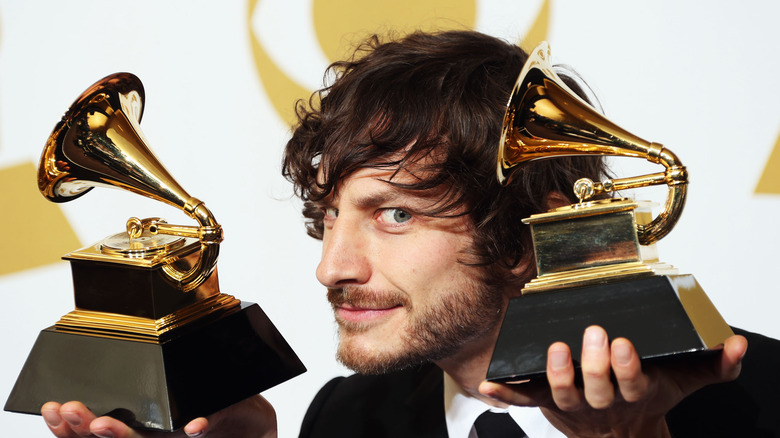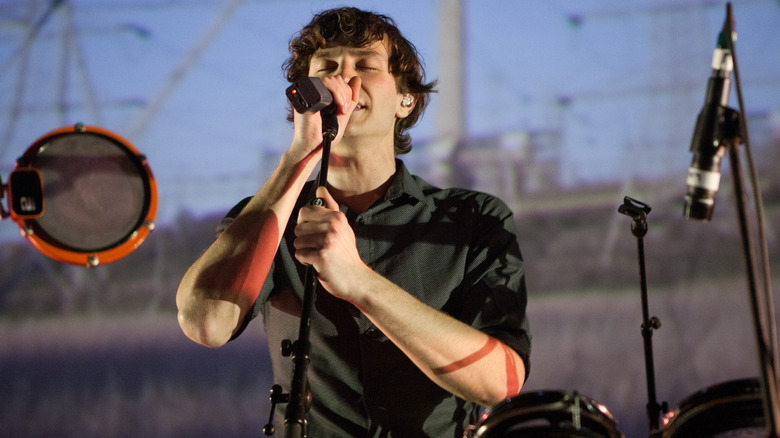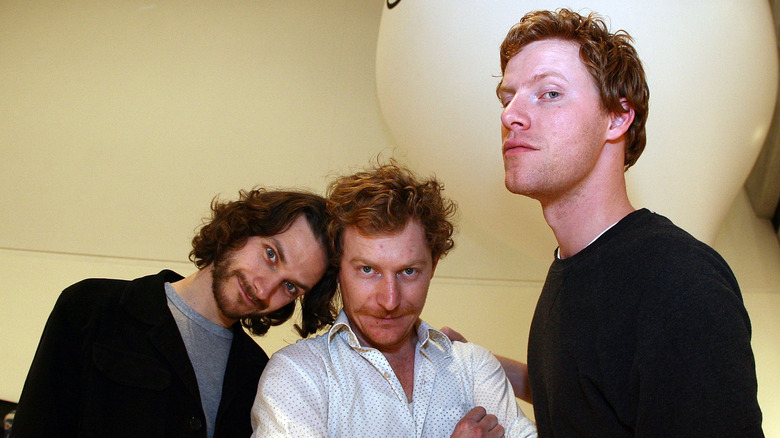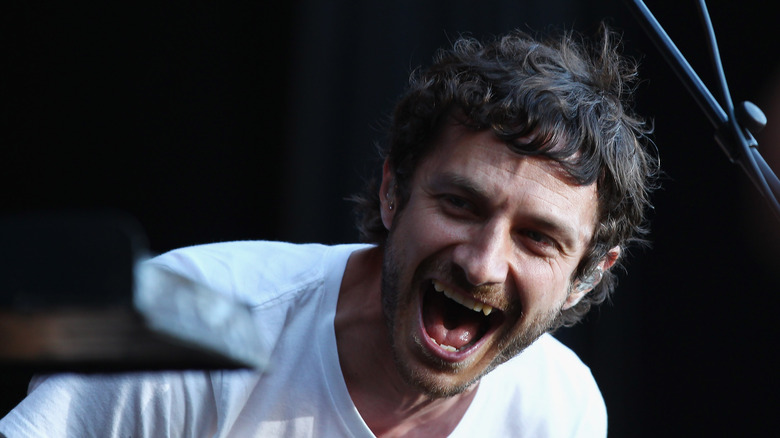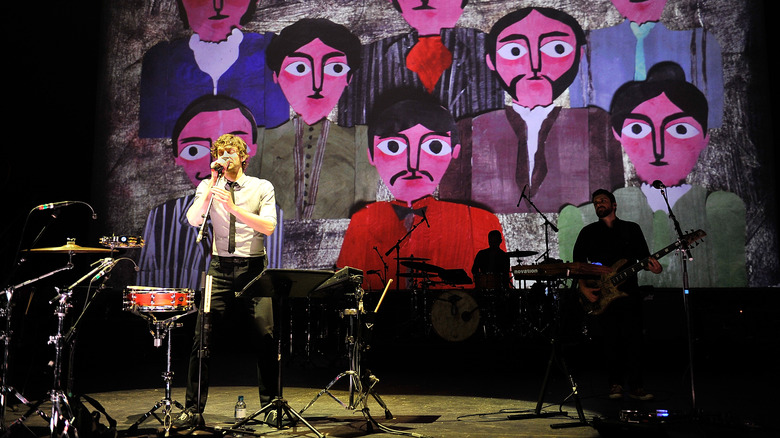What Really Happened To Gotye
Does the name Gotye ring a bell? He's definitely somebody that you used to know. This is especially true if you were born and not dead in the early 2010s, could hear, and/or hadn't escaped to an off-the-grid commune. Otherwise, you probably heard Gotye's track, "Somebody That I Used to Know," about 10 million-quadrillion-bajillion times.
It's hard to overstate exactly how big "Somebody That I Used to Know" was in 2011 when Gotye released his third studio album, "Making Mirrors." The song and album won three Grammys including Best Alternative Music Album, Best Pop Duo/Group Performance (Gotye tag-tamed the track with Kiwi pop artist, Kimbra), and Record of the Year. "Somebody That I Used to Know" went platinum 14 times, and at present has almost 1.9 billion Spotify listens — for a song that came out in Spotify's early days. And, Gotye has over 17 million monthly listeners on Spotify. Also, the super iconic video has 2.3 billion views.
But as soon as Gotye appeared he vanished, dropping his nuclear song and whisking away to whatever planet birthed him. Or, he went back to Australia (he's Belgian and was raised in Australia). And what did Wouter André "Wally" De Backer — aka, Gotye — do then? As The Music says, he didn't disappear from the music world, he just stepped behind the scenes. He co-launched the independent record label, Spirit Level, in 2014, formed a music-based NPO, Forgotten Futures, is a member of the Australian pop band The Basics, and more.
Gotye wasn't concerned with making money
Right from the get-go, Gotye had an atypical outlook on fame and financial success, just as atypical as his very memorable and creative video for "Somebody That I Used to Know." That video played a huge role not only in catapulting Gotye to stardom but in determining the course of his career and future. This is largely because Gotye released the video himself on his own YouTube channel, gotyemusic. He had control over what he allowed and didn't allow from his fandom in terms of covers and remixes. Most importantly, he had control over the video's monetization.
As News Corp Australia Network quoted Gotye in 2017, "I don't mind syncing my music with creative projects like TV or film. I've got my own set of rules I made, if a student film wants to use my film I say yes across the board, there's no money involved." Gotye, in fact, chose to not monetize the original video for "Somebody That I Used to Know," saying, "I'm not interested in selling my music." This decision led to Gotye losing $10 million, but he didn't care. He's still worth $10 million today, per Celebrity Net Worth. Gotye didn't just refuse to monetize his video, he seemingly actively collaborated with musically inclined fans who reached out to him. An old Reddit thread describes one fan reaching out to Gotye for feedback on a track, and Gotye obliging. A respondent to the post also said that he'd corresponded with Gotye via email, and Gotye let him into a show after tickets had sold out.
Gotye got burned out on fame and remixes
Gotye's decision to not cling tightly to his music or money led to a flurry of tributes, parodies, and remakes of "Somebody That I Used to Know." We've got, "The Star Wars That I Used to Know" (with 35 million views), "Some Bucky I Used to Know," a Captain America parody, the "Lord of the Rings"-based, "A Precious That We Used to Know," "Somebody That I'll Never Know" about organ donors, and loads and loads more. There are so many parodies that we've got whole video compilations of parodies that include topics like the Minions, Obama, Brexit, SpaghettiOs, zombies, etc.
In the end, fan involvement proved crucial to propelling "Somebody That I Used to Know" to stratospheric heights, aside from the qualities of the song's music. Regarding that music, Gotye on American Songwriter described his songwriting for "Somebody That I Used to Know" as "gradual and linear." He assembled the track bit by bit, and it really didn't come together until he developed the second, female part that provided an additional perspective on the breakup described by the song's lyrics.
But, all the fan involvement surrounding "Somebody That I Used to Know" made Gotya's very insular and sensitive creative process hard to sustain. As Upworthy quotes him, he started to feel "burnt out" by the remixes and overwhelmed by the need to make a huge follow-up hit. He even offered apologies for people hearing the song so much. Ultimately, "Making Mirrors" was his final solo album.
Gotye stayed in his band, The Basics
By the time "Somebody That I Used to Know" hit the airwaves in 2011, Wouter "Wally" de Backer — Gotye's real name — had been making music for a decade. He put out a bunch of EPs and LPs, including "Like Drawing Blood" released in 2006 in Australia and internationally in 2008, "Boardface" in 2003, and an early, very independent-looking and self-named album, "Gotye." This album is sometimes referred to by its first track, "Out Here in the Cold," and reveals that "Gotye" is just a phonetic spelling of the French Gaultier, a French version of the Dutch Wouter, Gotye's first name.
During this period, de Backer split his time between his independent work and his collaborative work with his band, The Basics. The Melbourne-based trio got together in 2002 around the same time as de Backer started releasing work under his independent Gotye project. The Basics is composed of Tim Heath on guitar, Kris Schroeder on bass and vocals, and de Backer (Gotye) on drums, of all things. But, this shouldn't really come as a surprise given how percussive and synth-oriented de Backer's solo work is.
The Sydney Morning Herald says that The Basics took a three-year break right when "Somebody That I Used to Know" took off, and got back together in 2014. They're still making music to this day, including 2021's B.A.S.I.C. So when Gotye said goodbye to his solo project? He just stayed in his band — no biggie.
Gotye and his band started a political party
Now we come to a strange turn of events in 2014, the year that The Basics got back together. That year, the band announced via Facebook that they were starting their own political party in Victoria, Australia: The Basics Rock 'n' Roll Party (BRRP). This announcement came with an explanation about how to join the party and mentioned two key party tenets: "Indigenous local learning in Victorian schools" and "compulsory first-aid training for high school students." Regarding the former, the band believed that Indigenous Australians should learn their own culture as well as modern school curricula. And regarding the latter, the goal was to teach basic life skills and "alleviate some of the strain from our already over-worked healthcare professional."
The Basics bassist and singer Kris Schroeder said on The Guardian that year, "Politics in this country is treated like it belongs to the elite ... We have these career politicians who often come from well-to-do families." He also said that the BRRP wanted to emphasize music education in schools. A second article from The Guardian in 2014 says that the trio won the requisite 500 members needed to create their party, and intended to run as upper house candidates in Australia's parliament. There's no word whatsoever on the party's fate past that point, though.
At the same time, the Independent quotes Gotye from a 2014 interview with Radio Today saying, "I am not running for parliament in Victoria, as some publications have been not even implying but actually stating."
Gotye founded the NPO, Forgotten Futures
In 2014, the same year that The Basics got back together and announced that they were forming a political party, The Guardian explains that Gotye showed up in a documentary about an indigenous Australian shaman and didgeridoo — yirdaki, more accurately — maker, Djalu Gurruwiwi. The Melbourne International Film Festival says that Gotye played a role in the film by becoming one of Djalu's "unexpected family members" and helping spread Djalu's traditional music, how that collaboration happened.
In keeping with the same theme of musical preservation, Gotye also founded a Brooklyn-based non-profit, Forgotten Futures. The NPO's goal is to "revive lost and forgotten yet vital artifacts of electronic musical instrument history by collecting, faithfully restoring and preserving original instruments" as well as highlight these instruments' creators and cultural impact. According to Gotye's Instagram, this is what he's primarily working on at the moment. He also co-founded his own Melbourne-based record label in 2014, Spirit Level.
But even though Gotye is primarily working behind the scenes, he isn't above a little musical callback to his "Making Mirrors" days. In 2020, he and The Basics did a little impromptu performance of "Somebody That I Used to Know" at the Northcote Social Club in Victoria, Australia. And yes, everyone in the crowd knew every single word. More recently in 2024, Gotye released a remixed dance version of his hit track on Soundcloud, reminding everyone why it was such a smash to begin with. It seems like Gotye isn't just somebody that people used to know, after all.
